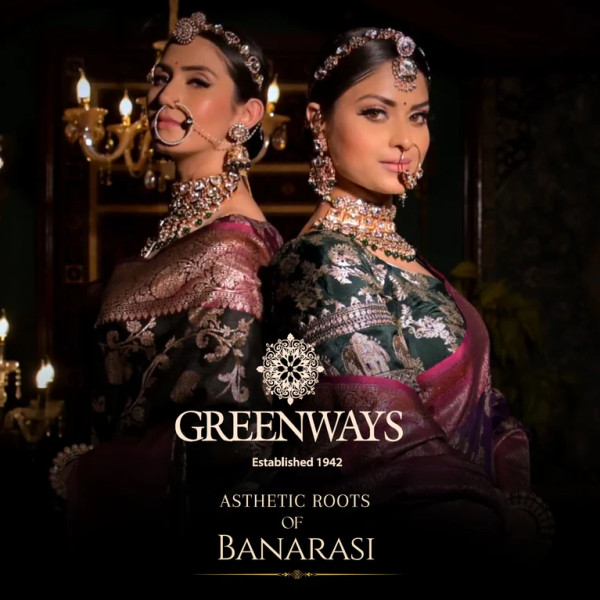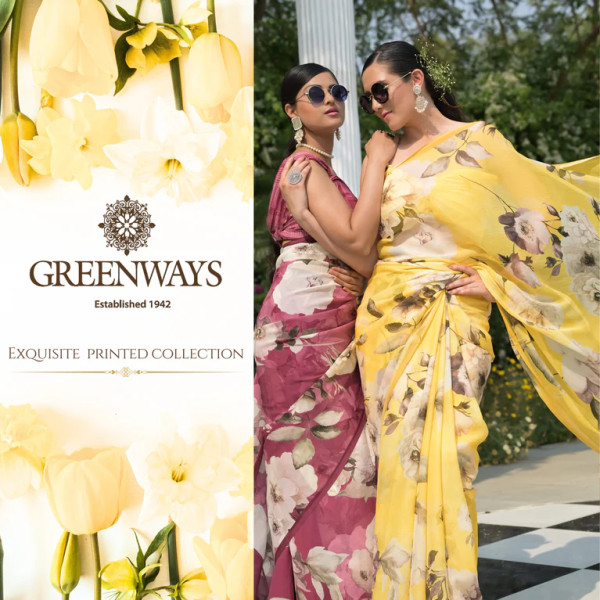Discover the rich heritage of Indian women’s ethnic wear through the captivating journey of GREENWAYS. From timeless traditions to contemporary elegance, delve into the legacy of craftsmanship, colors, and cultural narratives, weaving together a tapestry of diversity and beauty.
New Delhi, Delhi, India, 10th May 2024 – Since its inception in 1942, GREENWAYS has carved a niche for itself as a pioneering brand in the women’s ethnic apparel industry in India. With over eight decades of experience, GREENWAYS stands as a testament to tradition, quality, and innovation.
The Founding Years
GREENWAYS was founded in 1942, at a time when India was on the brink of its independence. Amidst the socio-political upheaval, the founder of GREENWAYS, Mr. Attar Chand Jain envisioned a brand that would celebrate India’s rich textile heritage while catering to the evolving fashion sensibilities of Indian women. The initial focus was on traditional sarees, a timeless garment that has symbolized Indian culture for centuries.

Quality and Craftsmanship
From the beginning, GREENWAYS set a high standard for quality and craftsmanship. The brand sourced the finest fabrics and employed skilled artisans to create exquisite sarees, and other ethnic garments. This commitment to quality became a hallmark of GREENWAYS and earned the brand a loyal customer base.
Embracing Tradition and Modernity
While rooted in tradition, GREENWAYS has always been open to innovation. Over the years, the brand has evolved to meet the changing needs of Indian women. It introduced contemporary designs and styles, blending traditional elements with modern aesthetics along with diversifying its product line to unstitched suit fabrics, readymade garments, shawls and other accessories. This fusion approach allowed GREENWAYS to appeal to a broader audience while maintaining its core values.

The GREENWAYS Experience
One of the distinguishing features of GREENWAYS is the shopping experience it offers. The brand’s flagship stores are known for their elegant interiors, personalized customer service, and a vast array of ethnic apparel. Customers are greeted with warmth and guided through a curated collection, ensuring they find the perfect outfit for every occasion.
A Legacy of Empowerment
Beyond fashion, GREENWAYS has played a role in empowering women in India. The brand has provided employment opportunities to countless artisans, many of whom are women. By preserving traditional crafts and techniques, GREENWAYS has contributed to the livelihoods of entire communities.
- Digital Innovation: Embracing Technology for Growth To stay competitive in the digital age, Greenways recognizes the need to embrace technology and enhance its online presence. Greenways plans to strengthen its e-commerce platform, offering a seamless shopping experience and a wider range of products online.

Looking to the Future
As GREENWAYS continues to grow, the brand remains committed to its founding principles. It seeks to expand its presence across India and beyond, while staying true to its roots. The focus on quality, craftsmanship, and customer experience remains as strong as ever.
In conclusion, the legacy of GREENWAYS is a story of tradition, innovation, and empowerment. From its humble beginnings in 1942 to its current status as a revered brand in women’s ethnic apparel, GREENWAYS has made a lasting impact on Indian fashion and culture. With a rich history and a bright future, GREENWAYS is poised to continue its journey as a beloved brand for generations to come.
Media Contact
Organization: Greenways
Contact Person: Greenways
Website: https://greenways.co/
Email: Send Email
Contact Number: +911123415740
Address: E-20 Connaught Place, New Delhi -110001, India
City: New Delhi
State: Delhi
Country: India
Release Id: 10052411974
The post Legacy of GREENWAYS: A Journey Through Women’s Ethnic Apparel in India appeared first on King NewsWire. It is provided by a third-party content provider. King Newswire makes no warranties or representations in connection with it.
Disclaimer: The views, suggestions, and opinions expressed here are the sole responsibility of the experts. No EU Brief journalist was involved in the writing and production of this article.
